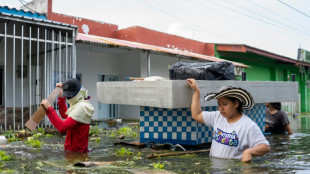

UK risks more extreme, prolonged heatwaves in future: study
The UK could experience more frequent extreme and prolonged heat due to climate change, its meteorological office said Wednesday, as the country braced for its first heatwave of the year.
Met Office scientists said the island nation will see the "increased likelihood of extreme temperatures" over 40 degrees Celsius (104 degrees Fahrenheit).
The new study also "highlights how UK heatwaves could become longer and hotter due to escalating climate trends", the Met Office added.
According to the research, in the current climate, heatwaves in the UK could persist for "a month or more".
The UK, which is known for its frequent showers and mild summers, recorded its first temperature above 40 degrees in 2022.
"The chance of exceeding 40 degrees C has been rapidly increasing, and it is now over 20 times more likely than it was in the 1960s," said Gillian Kay, senior scientist at the Met Office.
"Because our climate continues to warm, we can expect the chance to keep rising," said Kay, adding there was a 50-percent chance of seeing a 40-degree day in the next 12 years.
Scientists warn the intensity and frequency of global extreme weather events will increase as the planet continues to heat up because of fossil fuel emissions.
On Monday, the Met office said a heatwave was "likely" in much of the UK this week, with the highest temperatures expected to exceed 30 degrees.
"These findings highlight the need to prepare and plan for the impacts of rising temperatures now," said co-author Nick Dunstone.
The UK this year experienced its warmest spring on record.
It also had the driest spring in over 50 years, with farmers facing damaged crop growth and the government warning about "exceptionally low" water reservoir levels.
In May, the Environment Agency's deputy water director Richard Thompson warned that "changing climate means we will see more summer droughts in the coming decades".
G.Galli--GdR


